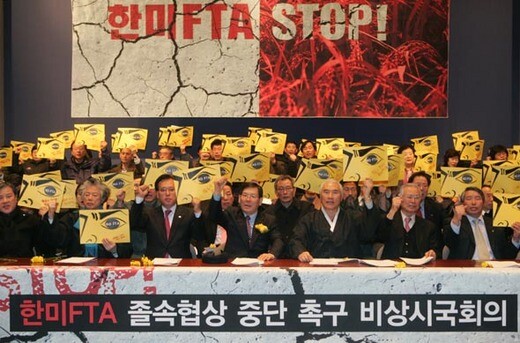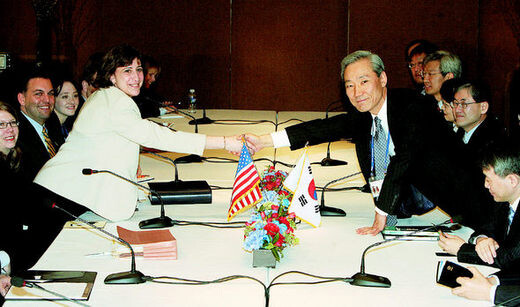hankyoreh
Links to other country sites 다른 나라 사이트 링크
As 8th round of S.K.-U.S. free trade talks opens, same questions linger

As the South Korean government moves to sign a free trade agreement (FTA) with the U.S. by the end of this month, critics have continually raised concerns that the deal’s preparation has been too hasty and the proposed FTA could cause unfair trade relations between the two countries.
Seoul and Washington kicked off their eighth round of FTA negotiations here in Seoul for a five-day run. The two countries have held such talks for the past ten months but have so far failed to produce a breakthrough to seal an agreement.
A group of critics of the proposed deal, including lawmakers, labor activists, and priests, gathered on March 8 in central Seoul to voice their concerns over what they call a hasty and unfair trade deal that Seoul is seeking with Washington.
"The unfair negotiations carried out in a hurriedly and undemocratic way should be stopped immediately," the participants said in a joint statement, signed by 870 persons, including members of civic groups and 28 lawmakers.

They raised concerns that the government has already made many compromises in the ongoing talks, especially in the automotive, pharmaceutical, beef, and intellectual property right sectors, in order to clinch a deal.
The group added that the government agreed to allow investors to file a suit against the government of the other country without ensuring proper measures to fend off the efforts of potentially harmful speculative funds attempting to gain a foothold in South Korea. The group went on to say that the lawsuit system, if left in place as is, could contradict South Korea’s Constitution.
"Even in such areas as trade remedies, textiles and state procurement of foreign contracts, we have little to gain, unlike what the government has been arguing," they said. They continued to state that, because the government has made many compromises in order to initiate free trade negotiations with the U.S, the group worried that the ongoing talks would turn out to be "half-baked."
Seoul says it aims to seal a deal soon by resolving major issues at this ongoing round of talks and ironing out minor differences shortly through closed-door high-level talks. Seoul wants to complete the deal by the end of this month, given that U.S. negotiators have until April 2 to submit the free trade deal to Congress to be approved by a ’yes’ or ’no’ vote under the Bush administration’s "fast-track" Trade Promotion Authority. After that date, each tenet of the agreement would require Congressional approval, in a Congress with a Democratic majority, many say the interests of U.S. farmers and industries will be protected and the deal will have a harder time getting passed.
The FTA with the U.S. has been objected to by many South Korean labor activists, farmers, and others whose livelihood would be at stake should trade barriers be opened between Korea and the world’s largest economic power.
"In addition to those who have spearheaded the opposition, we saw social leaders from many walks of life here, which is meaningful in that it highlights the fact that we have gathered a public consensus in opposing the free trade deal with the U.S," said Lee Hae-young, one of the participants and a professor of Hanshin University.
Even lawmakers who had previously been lenient on the government’s pursuit of the trade deal moved to block what they call a hurriedly arranged agreement. Twenty-one lawmakers including Chae Su-chan, Kim Bu-kyum of the ruling Uri Party, Kim Yang-soo of the opposing Grand National Party, and Chae Il-Byung of the other opposing Democratic Party sent an open letter to President Roh Moo-hyun urging him to put the national interest first in his push for the free trade agreement.
The lawmakers cited the following as priorities that should not be compromised: the easing of anti-dumping regulations in U.S. trade remedies, a ban on bone-in beef imports, the inclusion of products made in the joint North-South factory in North Korea’s Gaeseong (Kaesong) as made in South Korea, the exemption of the real-estate and taxation policies from being targets of lawsuits from the other country’s firms, the approval of safeguards in the financial industry, and several measures indended to protect local industries from U.S. competition.
"Given the negotiations in the past months, it is impossible to erase the impression that the government has not really adhered to the principle of ‘national interest first,’ " said Chae. "When such cited issues are resolved, the government will be able to receive public support and approval from the National Assembly" for the trade deal, he said.
A group of lawmakers that recently defected from the ruling Uri Party also suggested in a statement released on the same day guidelines for the ongoing talks, including objection against what it called the erosion of national sovereignty and Korea’s right to set its own public policy without outside interference.
Please direct questions or comments to [englishhani@hani.co.kr]
Editorial・opinion
![[Editorial] Does Yoon think the Korean public is wrong? [Editorial] Does Yoon think the Korean public is wrong?](https://flexible.img.hani.co.kr/flexible/normal/500/300/imgdb/original/2024/0417/8517133419684774.jpg) [Editorial] Does Yoon think the Korean public is wrong?
[Editorial] Does Yoon think the Korean public is wrong?![[Editorial] As it bolsters its alliance with US, Japan must be accountable for past [Editorial] As it bolsters its alliance with US, Japan must be accountable for past](https://flexible.img.hani.co.kr/flexible/normal/500/300/imgdb/original/2024/0417/6817133413968321.jpg) [Editorial] As it bolsters its alliance with US, Japan must be accountable for past
[Editorial] As it bolsters its alliance with US, Japan must be accountable for past- [Guest essay] Amending the Constitution is Yoon’s key to leaving office in public’s good graces
- [Editorial] 10 years on, lessons of Sewol tragedy must never be forgotten
- [Column] A death blow to Korea’s prosecutor politics
- [Correspondent’s column] The US and the end of Japanese pacifism
- [Guest essay] How Korea turned its trainee doctors into monsters
- [Guest essay] As someone who helped forge Seoul-Moscow ties, their status today troubles me
- [Editorial] Koreans sent a loud and clear message to Yoon
- [Column] In Korea’s midterm elections, it’s time for accountability
Most viewed articles
- 1[Column] The clock is ticking for Korea’s first lady
- 2Samsung barricades office as unionized workers strike for better conditions
- 3[Editorial] When the choice is kids or career, Korea will never overcome birth rate woes
- 4[News analysis] After elections, prosecutorial reform will likely make legislative agenda
- 5Why Israel isn’t hitting Iran with immediate retaliation
- 6S. Korea, Japan reaffirm commitment to strengthening trilateral ties with US
- 7[Editorial] Does Yoon think the Korean public is wrong?
- 8[Guest essay] How Korea turned its trainee doctors into monsters
- 9[Editorial] 10 years on, lessons of Sewol tragedy must never be forgotten
- 10Strong dollar isn’t all that’s pushing won exchange rate into to 1,400 range